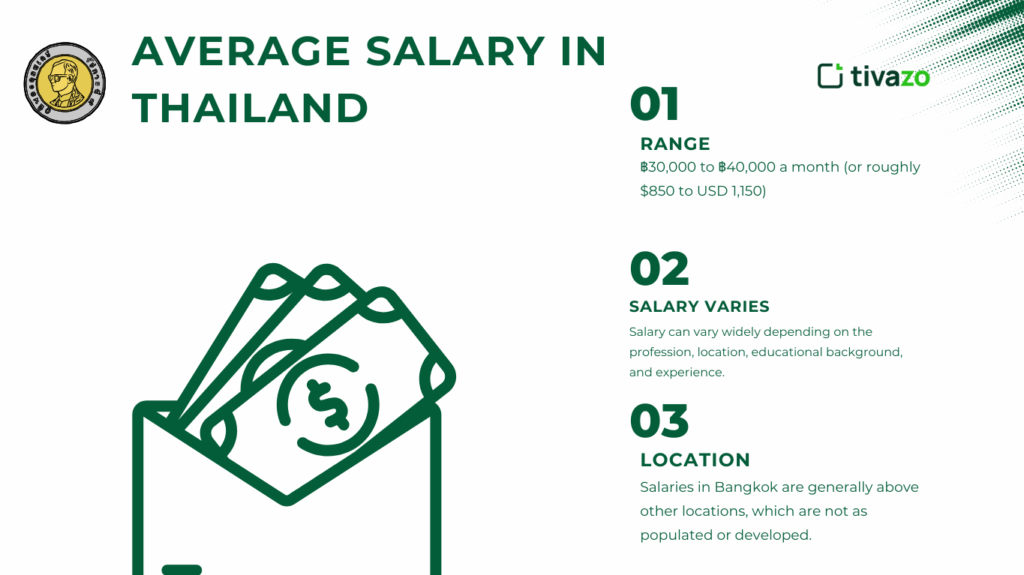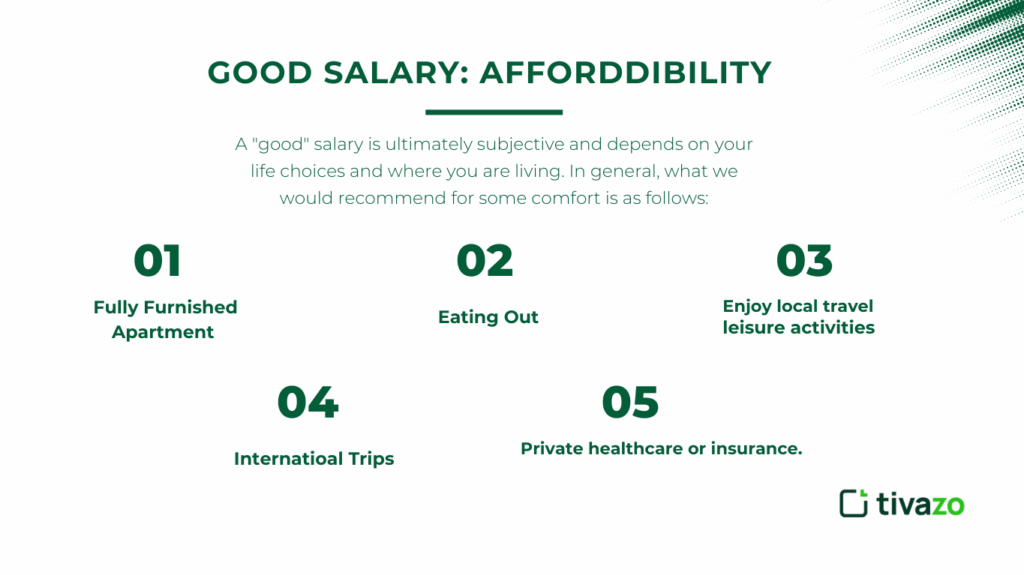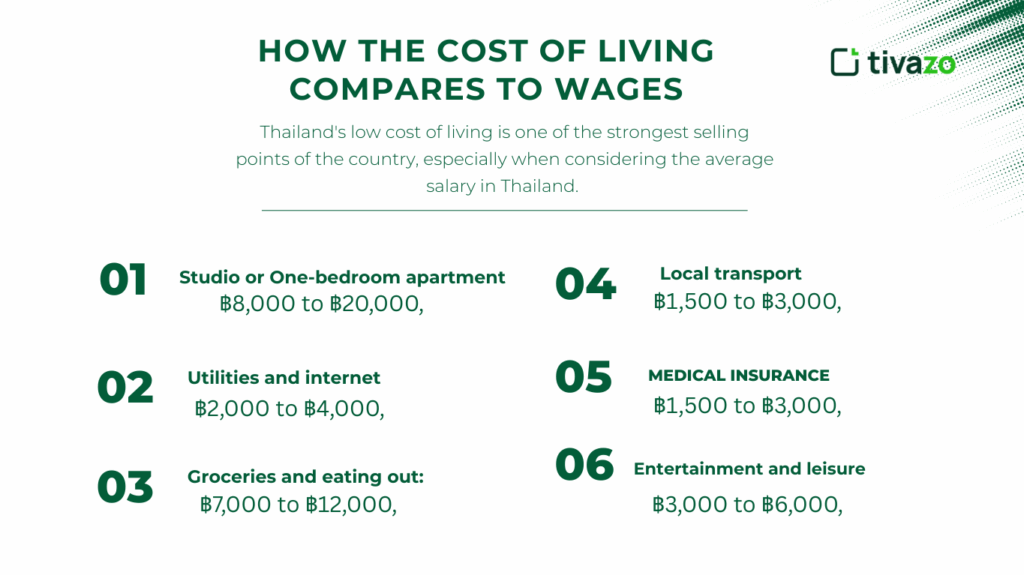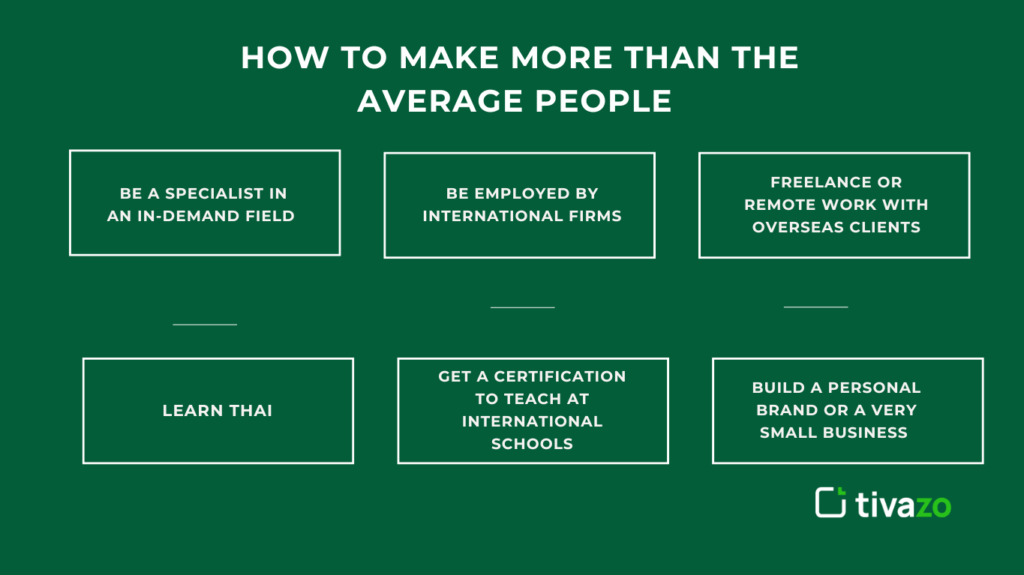If you’re thinking of moving to Thailand for work or are just curious about how much Thai people earn, it’s essential to have some knowledge of the average salary in Thailand. Thailand is a unique mix of affordability, comfort, and culture. But just how much money do you need to live well?
This blog will explore what the average income in Thailand looks like in 2025, what a good salary is, whether or not you can live on $1500 per month, what the minimum wage is, and what kind of money foreigners earn within the country.
What is the Average Salary in Thailand?
In Thailand in 2025, the average salary is likely to be in the range of:
- ฿30,000 to ฿40,000 a month (or roughly $850 to USD 1,150)
- Salary can vary widely depending on the profession, location, educational background, and experience.
- Salaries in Bangkok are generally above other locations, which are not as populated or developed.
Although the national average salary of Thailand sounds alarming, some professions offer a salary multiple times the average (think: doctors, lawyers). Any educated person realizes that many Thai citizens who work in the retail or hospitality sector are lucky to earn the minimum wage or more.

Thailand’s Minimum Wage per Month
Minimum wage in Thailand is not set across the country. Minimum wage is an amount set by the province (or region); however, the general daily range in 2025 is expected to be:
- ฿330 to ฿370 per day
- This is approximately ฿10,000 to ฿11,500 a month (if working full-time)
Below are some highlights:
- Bangkok and the surrounding area pay the highest minimum wage (฿370 daily)
- The northern region or rural areas of the country pay closer to ฿330/day
- And while immediately shocking, in urban areas, this barely gets you above basic living conditions.
Even though the minimum wage is well below the average salary in Thailand, it is a legal protection for employees throughout the country.
What Is a “Good Salary” In Thailand?
A “good” salary is ultimately subjective and depends on your lifestyle choices and where you are living. In general, what we would recommend for some comfort is as follows:
- ฿50,000 to ฿70,000 per month in Bangkok
- ฿40,000 to ฿60,000 per month in Chiang Mai, Phuket, and other areas.
If you can bring in anything more than ฿60,000/month, you’ll be able to save, travel, and enjoy a typically higher standard of living.
Able to afford comfortably:
- A modern one-bedroom apartment in nice premises.
- Eating out several times a week.
- Enjoying local travel/leisure activities.
- Occasional international travel.
- Private healthcare or insurance.
So whilst the average salary in Thailand may seem low by Western standards, a “good salary” goes a long way!

Can I Live in Thailand for $1500 a Month?
Yes, it is feasible to live in Thailand for $1,500 a month, and it’s quite comfortable for a single person. In Thai Baht, it’s about ฿54,000 a month, which is well above the average salary in Thailand.
Here’s what you can comfortably cover for $1,500/month:
- Rent for a modern apartment: ฿12,000 to ฿18,000
- Food (groceries): ฿8,000 to ฿12,000+
- Utilities and high-speed internet: ฿2,000 to ฿3,500
- Transportation (public and private): ฿1,500 to ฿3,000
- Entertainment and leisure: ฿3,000 to ฿6,000
- Gym membership, shopping, personal expenses: ฿5,000+
The possibilities for your lifestyle may leave you with a little left over for savings and emergencies. Many expats and digital nomads create an income stream from Thailand and live on this budget with luxuries that were otherwise unattainable back home. With low rent, cheap transportation, and plenty of affordable yet delicious food, there’s simply no reason to live life financially stressed while still living well. With an average salary in Thailand as mentioned above, it is feasible, but for a comfortable life, it may be difficult.
A lot of foreigners find that they can travel regularly around Thailand and visit neighbouring countries like Vietnam, Malaysia, or Cambodia, and it does not always create financial pressure. While making a moderate amount of money, life in Thailand encourages weekend getaways, wellness, and a well-balanced lifestyle that outsiders may view as impossible.
Average Salary in Thailand by Sector
There is a natural variance in wages across different jobs, and even more variance depending on the industry. Here is how the average salary in Thailand breaks out by sector:
- IT & Tech: ฿40,000 – ฿80,000 per month
- Education (including English teachers): ฿25,000 – ฿60,000 per month
- Healthcare: ฿35,000 – ฿70,000 per month
- Tourism & hospitality: ฿18,000 – ฿45,000 per month
- Finance & banking: ฿45,000 – ฿90,000 per month
- Construction & manufacturing: ฿20,000 – ฿40,000 per month
- Freelancers or remote workers: Highly variable; can be greater than ฿100,000 depending on existing clientele
This knowledge helps you gain better insight into how your choice of career affects the average salary in Thailand. The many industries you can go into open the door to different earnings levels. Therefore, if you align your skill sets to industries that are considered high demand, you will have a better chance of eventually earning above an average salary in Thailand.
Average Salary In Thailand for Foreigners
Usually, as per the data, foreigners tend to earn more than the local people. If work permits and visas are not required. Although foreign employees are, of course, subject to work permit and visa regulations, restrictions even the categories of jobs.
Common earnings for foreigners are:
- Language school English teachers: 30,000 Baht to 50,000 Baht
- International school teachers: 70,000 Baht to 150,000 Baht
- Professionals in business and finance (Marketing, banking, etc.): 70,000 Baht to 200,000 Baht
- Technology workers and developers: 60,000 Baht to 120,000 Baht
- Managers in the hospitality sector: 50,000 Baht to 90,000 Baht
- Digital nomads or freelancers: Highly variable – could be over 150,000 Baht in some cases
While the average salaries for foreigners in Thailand are above the local average, jobs of this nature are also dictated by your qualification level, type of visa, and limitations of Thai labor law.
Regional Salary Variations
There is a lot of variation in Thailand, by way of income and costs, but location matters! The average salary in Thailand can vary greatly between cities depending on local job markets that have differences in living costs, and is usually correlated with where the economy chooses to focus.
Bangkok
- Largest earning potential in the country.
- Won’t find too much variation with salaries that average in the ฿40,000 – ฿60,000 range.
- Best chance for those in finance, IT, international business, and education.
Salaries in Bangkok tend to be high, but it also has the highest costs, too, which is something to consider. Rent, transport costs, and dining expenses are often noticeably higher. However, while housing is certainly more expensive, overall living conditions are more favorable, with better services for infrastructure, access to good-paying multinationals (which are rarely found in Chiang Mai), and far better access to healthcare.
Chiang Mai
- Salaries rarely exceed the ฿25,000 – 35,000 bracket.
- A popular destination for digital nomads and remote workers.
- Lower cost of living offsets lower salaries.
Considering the average salary in Thailand, Chiang Mai offers a relaxed lifestyle, scenic beauty, and a very solid expat community in the city. While salaries are higher in Bangkok, Chiang Mai offers a much better cost of rent and food, which makes the place a perfect place to live for remote workers and freelancers, who earn a foreign income while being able to have local costs.
Phuket
- Wages can run from ฿30,000 to ฿50,000 in Phuket
- The tourism-based economy can affect the availability of work.
- Seasonal nature can affect income and job availability.
Considering the average salary in Thailand, Phuket is mostly a tourism-based economy; hence, income can be erratic. Jobs can be found in hospitality, diving, and other recreational activities. These jobs tend to be transient and unassociated with long-term job security. Foreigners may work in resort management or villas where they may make good money, although they may not be busy during the off-peak season.
Typically, the average pay in Thailand differs across regions, but your potential to afford a typical lifestyle usually adjusts with similar prices. The better question has more to do with the actual job you do, how you are paid (as an employee or not).
How the Cost of Living Compares to Wages
Thailand’s low cost of living is one of the strongest selling points of the country, especially when considering the average salary in Thailand. Even those with average earnings can expect a decent standard of living compared to many Western countries.
Let us review what you can expect to spend in one month:
- Studio or One-bedroom apartment:฿8,000 to ฿20,000, depending on the area.
- Utilities and internet: ฿2,000 to ฿4,000.
- Groceries and eating out: ฿7,000 to ฿12,000.
- Local transport: ฿1,500 to ฿3,000.
- Medical Insurance: ฿1,500 to ฿3,000.
- Entertainment and leisure: ฿3,000 to ฿6,000.
If you are earning around ฿30,000 (the average salary in Thailand you will need to live frugally, most likely sharing an apartment, living in cheaper areas of town, and cooking most meals. Public transport will be required to stretch your money a bit farther.
If you earn over ฿50,000 a month, you will afford to live in a modern condo by yourself, eat out often, and save some money each month. Many people making foreign salaries or who work remotely find that their money goes a lot further in Thailand, allowing them a higher standard of living in Thailand than they could finance in their own countries.
When combined with its lifestyle benefits, Thailand can be a pretty affordable place to live for everyone.

How to Make More than the Average Salary in Thailand
If you’re going to be working or moving to Thailand and want to make more money, consider the following tips to get you above the average salary in Thailand:
- Be a specialist in an in-demand field – IT, finance, engineering, healthcare, etc.
- Be employed by international firms with offices in Thailand – usually,y they pay expats or skilled professionals more.
- Get a certification to teach at international schools rather than just language centres; the pay is much better, and you get benefits.
- Freelance or remote work with overseas clients receiving USD, EUR, or stronger currencies.
- Learn Thai – this will give you an advantage to find better employment, build a connection with local employers, and negotiate higher wages.
- Build a personal brand or a very small business servicing expats, tourists, or remote workers – there are many opportunities for services like consulting, coaching, design, or tourism.
If your main goal is to have a luxurious life in Thailand and you want to earn more than the average salary in Thailand, you will have to build up skills and knowledge in your field via online certification or classes, as per the market demand. Learn basic Thai for the least of making conversation with local people. Last, build the network and communicate with as many people as possible. Opening doors to hidden communities and opportunities.
Many expats who came to Thailand initially working at a low average salary of (for example) 30-50,000 baht per month eventually more than doubled or tripled their earnings, in part by moving into roles or freelance work that held higher value, or creating businesses and becoming more entrepreneurial. With the right mindset, you can usually earn more than the average or typical salary in Thailand while enjoying affordable living.

Conclusion
The average salary in Thailand may look low on paper, especially if you are migrating from the West. However, when compared with the cost of living in Thailand, it is possible to lead a healthy lifestyle, even an enjoyable lifestyle.
Whether you are a backpacker who wants to stay longer, a digital nomad looking for a base, or a skilled professional making a move for work, there are going to be lots of income options in Thailand. Planning is important, but it is possible to live comfortably, even on a shoestring budget.
With a delicious and affordable street food scene, beautiful beaches, and incredible history and culture, the lifestyle benefits would outweigh the perceived “low” pay in most situations, making Thailand an enticing foray into a sustainable long-term lifestyle.
FAQ’s
Can I live on $1500 a month in Thailand?
While it depends on lifestyle, many are able to live comfortably on 1500 - 2500 per month. Those who are seeking more a more comfortable lifestyle can reachable their goals with a budget around 2000 per month.
What is a good salary in Thailand?
Good Salary: A salary in the range of 50000 to 70000 THB (approx 1400 to 2000 USD) is considered good for having a comfortable lifestyle, so going out for dinner, renting a decent apartment, leisure activities, etc.
How to Earn More Than the Average Salary in Thailand
Focus on high demand industries, gain in demand skills, and gain experience.




